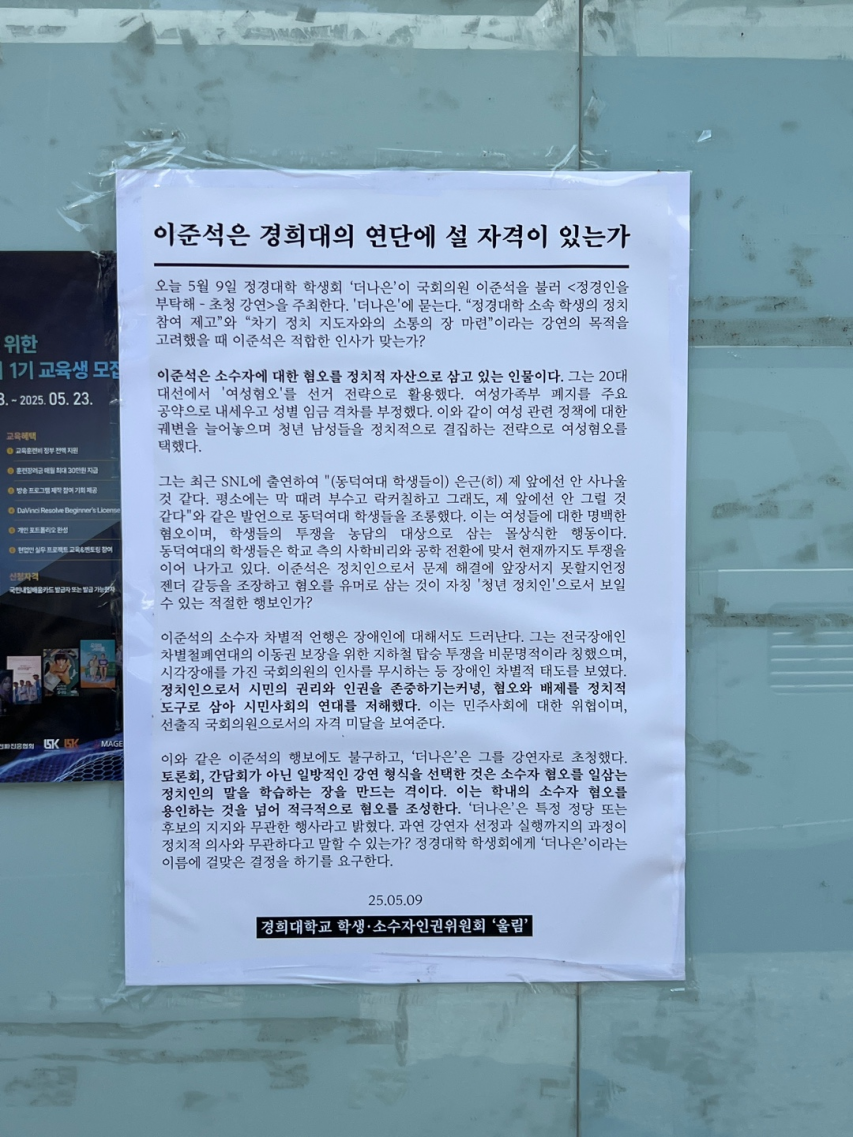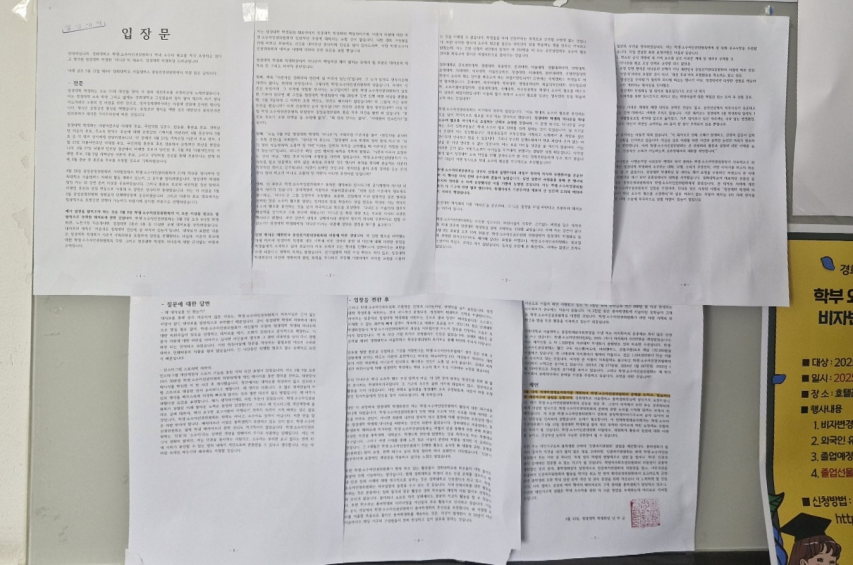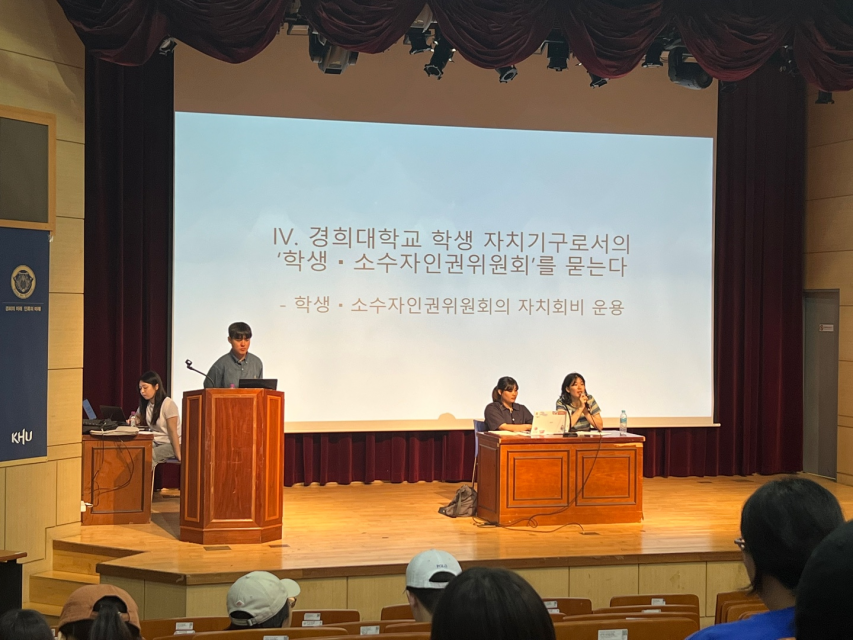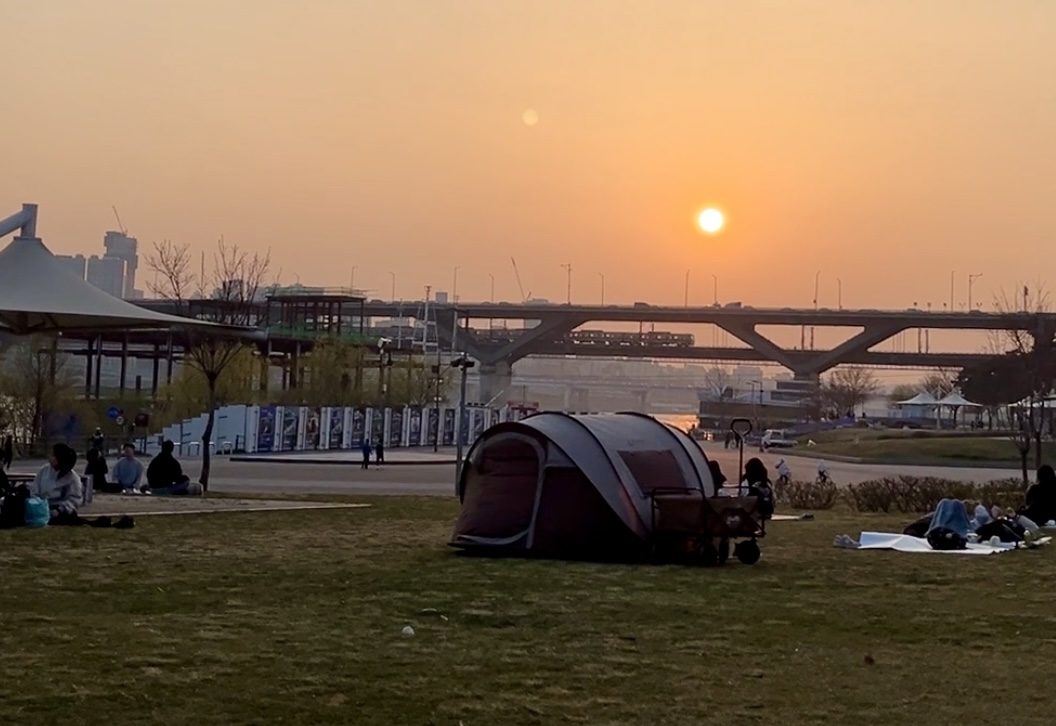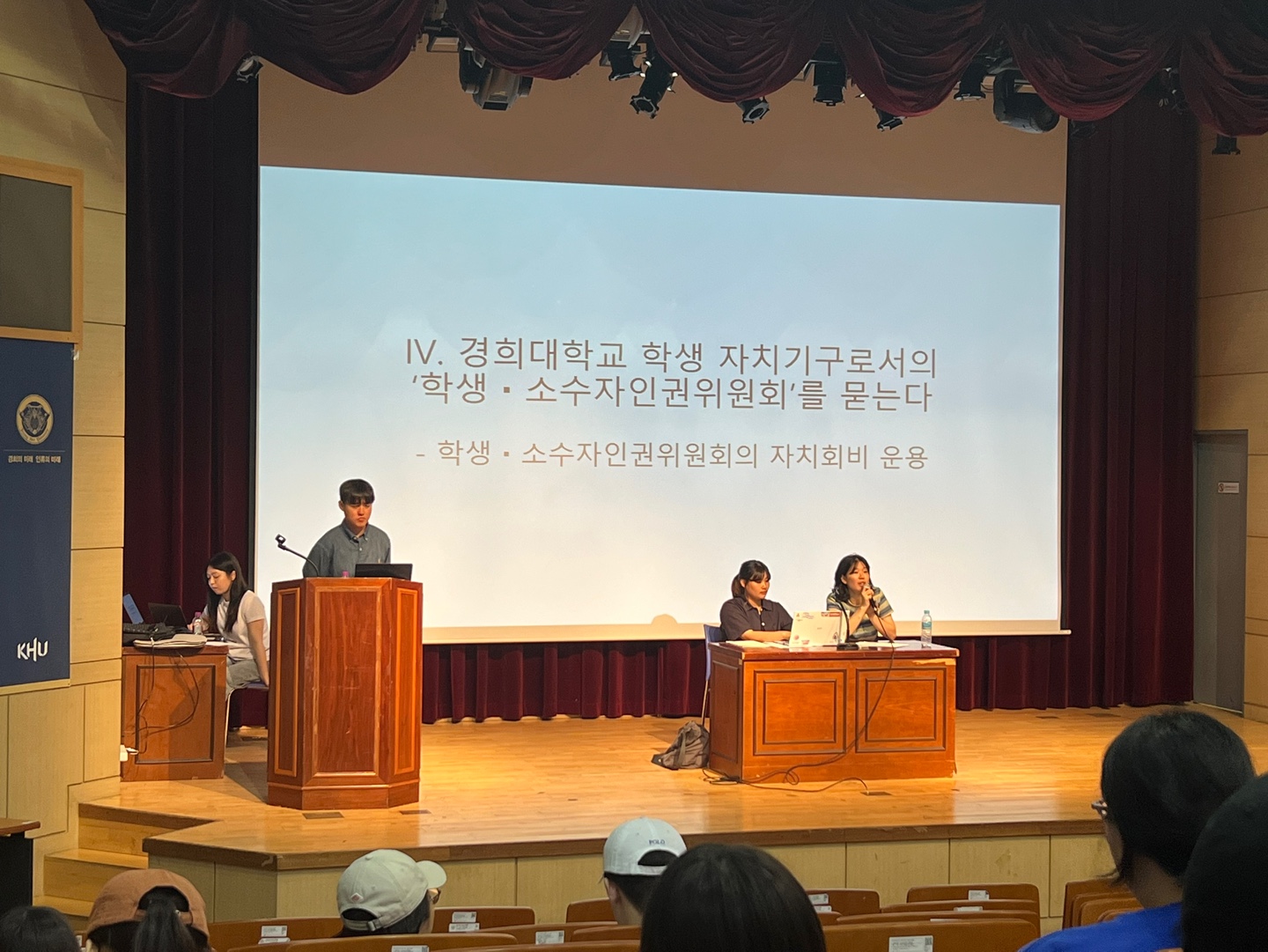[Campus] The Future of KHU’s Student Minority Rights Committee in Question
Conflict between the Student Minority Rights Committee—Ullim—and the College Student Association (CSA) of the College of Politics and Economics—The Naeun—sparks debate over the future of student organizations. Amid this, a public hearing focusing on Ullim’s role as a student self-governing body was held on June 13. Students at the hearing shared diverse views on the purpose and functions of student groups.
The protest poster posted by Ullim
Conflict Between Ullim and The Naeun
The conflict between Ullim and The Naeun began over objections to a lecture by presidential candidate Lee Jun-seok. On May 9, The Naeun invited Lee Jun-seok, the presidential candidate of the Reform New Party, to give a lecture. On the same day, Ullim posted protest posters throughout the Seoul Campus titled “Does Lee Jun-seok Deserve to Speak at KHU?” criticizing the event. They pointed the candidate’s past remarks that were seen as discriminatory and misogynistic remarks against people with disabilities, arguing that the remarks go against the University’s values of protecting minority rights.
In response, Shin Ha-kyun, the President of The Naeun, issued an official statement on May 13. Shin refuted Ullim’s criticism about political neutrality in the speaker selection process, stating that The Naeun had already explained both the purpose of the event and the rationale for selecting the speaker. On this basis, Shin demanded that Ullim issue an apology and remove the protest poster currently attached to the front of the CSA’s office. Moreover, Shin called Ullim’s actions an overstep of authority, warning that they would propose Ullim’s disbandment at the Expanded Operations Committee (EOC) if their demands were not met.
After their demands were rejected, he submitted a proposal to the GSA on May 23 to establish a new organization to replace Ullim. Shin cited several reasons for the proposal—violations of agreed procedures and operational principles, lack of political neutrality, insufficient transparency in budget management, inadequate student consensus on external alliances, and questions over Ullim’s legitimacy and representation. On June 2, at the Central Operations Committee meeting, the proposal was officially discussed and passed with 12 votes in favor, 3 against, and 6 abstentions.
Ullim strongly denied the accusations. They emphasized that raising human rights issues is a legitimate function of a student self-governing body. They argued that the discussion over their disbandment amounts to the suppression of a minority rights group.
The dispute has led to increased public scrutiny of the role and necessity of Ullim. On June 13, a public hearing titled “Questioning Ullim as a Student Self-Governing Body” was held. Based on the discussions from the hearing, the EOC is scheduled to reconsider Ullim’s disbandment at its regular meeting on June 25.
The protest poster posted by Shin Ha-kyun
Public Hearing: Question the Role of the Student Minority Rights Committee
On June 13, a public hearing titled “Questioning the Student Minority Rights Committee as a Student Organization at KHU” was held in Room 111 of Ovis Hall. The GSA president, vice president, and Ullim attended the hearing, which was open for all students to observe and participate in the question-and-answer (Q&A) session. The hearing featured diverse opinions from students and officials on the existence and role of student organizations on campus.
At the hearing, Ullim defended its operations as transparent and legitimate, and emphasized that advocating for minority rights is inherently political but not partisan. Ullim stated that its budget execution and accounting are regularly reported, and all projects are approved through the student representatives' meeting. Additionally, they highlighted activities such as support for student groups and disability rights initiatives. Furthermore, Ullim said that advocating for minority rights is inherently political but not partisan, and that their role is to represent student voices and mediate conflicts within the university community.
The hearing participants raised concerns about Ullim’s representation, membership structure, and lack of promotion for its activities. They also questioned the credibility of the petition opposing its disbandment. Some asked whether it was appropriate to operate student fees with only 15 to 18 active members. Others wondered if poor promotion contributed to the debate over Ullim’s existence. In response, Ullim said membership recruitment is ongoing. They plan to strengthen outreach through official social media and offline booths. Ullim added that the petition collected around 1,900 signatures from KHU members. However, they acknowledged credibility issues due to the anonymous Google Forms used.
Criticism arose over Ullim’s external alliances and political stances during the public hearing. Some students questioned if Ullim took a specific political stance and if joining controversial protests under the University’s name was appropriate. Ullim replied that human rights issues are inseparable from social structures and that minority rights cannot be resolved solely within legal frameworks. They emphasized the context and necessity of disability mobility protests and the importance of solidarity for minority rights, both on and off campus.
There were calls for Ullim to remain an independent student committee. Supporters said it plays a crucial role in representing minority rights, which are often ignored on campus. They argued that rather than disbanding Ullim, efforts should be made to fix its problems and improve its work. Some warned that merging Ullim with GSA could reduce its autonomy.
Ullim delivering remarks at the public hearing
Students Express Disappointment Over Public Hearing Format
Concerns about the format and conduct of the public hearing were also raised by several students. One of the main points of criticism was the absence of the President of The Naeun, who did not attend the public hearing in person despite being a central figure in the conflict. Kim Jung-yeon, a student of the Dept. of Sociology, said, "It is very disappointing that Shin did not attend. Questions and criticisms regarding Shin were limited to pre-submitted questions, and it was difficult to understand his position, which diminished the significance of the public hearing." According to the moderator's response, even the answers to the pre-submitted questions could only be partially disclosed. She expressed doubts about whether this could truly be considered a fair and democratic public hearing.
Regarding the absence, the GSA showed they would reveal Shin’s stances at the future official meeting. They stated that they had collected written answers from relevant parties for the pre-submitted questions, and that any follow-up inquiries would be relayed directly to those involved. They added that official responses would be shared with the student body through social media and other platforms after approval by the Central Operations Committee.
Additional concerns were raised regarding the structure of the hearing itself. Students in the public hearing asked about the difference between pre-submitted sessions and live Q&A sessions. They hoped that the live Q&A sessions would lead to more in-depth discussions based on the pre-submitted questions, but the live Q&A sessions system failed to sufficiently address their needs.
More than the issues of absenteeism and the structure of hearing operations, other aspects also brought dissatisfaction. The closing time of the event had not been announced in advance. Additionally, some criticized the lack of effective moderation during the Q&A session, noting that the facilitator did not consistently manage the flow of discussion. Due to time constraints, not all the students who wished to question received the inquiry opportunity, which further fueled dissatisfaction.
Although the public hearing aimed to foster discussion about Ullim's role and future, the conversation fell short of expectations. Several shortcomings contributed to this disappointment, including the absence of the CSA president, structural issues, and more. With the EOC meeting approaching on June 25, additional efforts are needed to ensure that the appropriate decision-making regarding the student body affairs.
There are no registered comments.
- 1
- 2
I agree to the collection of personal information. [view]


